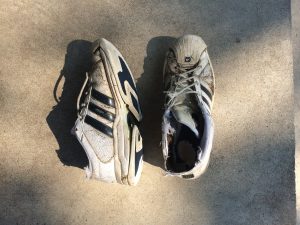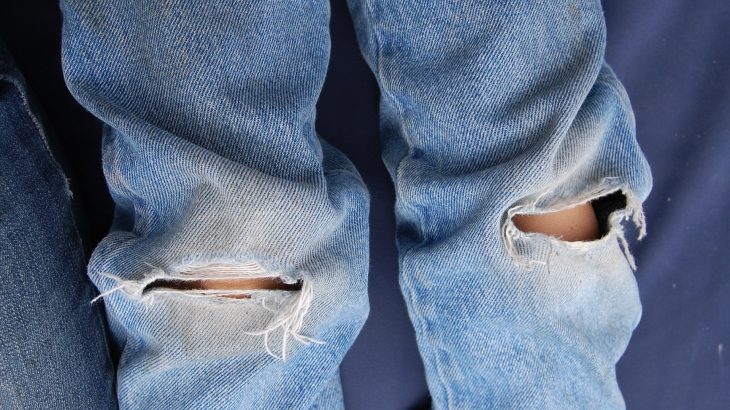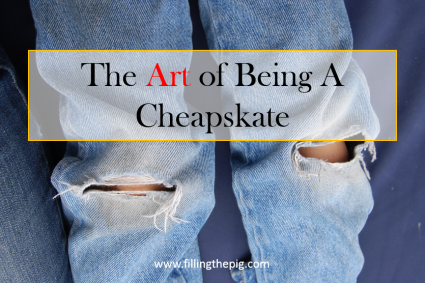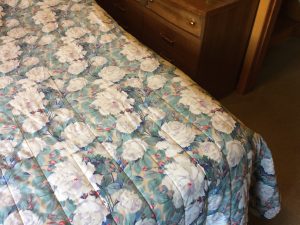The art of being a cheapskate isn’t about giving everything up. It’s about managing your money in a different way. A means of doing the things you want at the expense of those things that are less important. Here’s a perspective on how I manage my budget to achieve cheapskate status.
The Dreaded “B” Word
It’s that feeling of being restricted or confined, like sitting in the middle seat of a commercial airliner knowing you’re going to have to inconvenience someone when you have to use the bathroom. The perspective that you have to give something up. Like wanting to watch your favorite football game or that new episode of Dancing with the Stars, but you have to work instead. The procrastination of knowing what you need to do, but not wanting to do it. Cleaning the cat’s litter box, doing the laundry, or like me cleaning the shower.
It’s the dreaded “B” word of personal finance – budgeting. The one area of personal finance where managing your money can feel like an unwanted household chore.
If you’re paying off credit card debt every month it’s easy to see the progress as you slowly whittle away at the balance. Working on building up your emergency fund? Watching your savings account rise is a sign of success and a great motivator.
But when you budget your money the sheer task of managing your spending to meet your budget can feel restrictive, and that can make it very hard to stay focused and achieve your financial goals.
We’re All Different
One of the things I have learned over the years in relation to budgeting is that once you work through the first few months. And see the impact on your finances, the whole process becomes much easier. Part of this is simply due to repetition, the more times you do it the better you get. The other reason and the reason that’s most important is that over time you adapt your spending habits to meet your budget goals.
Individually we are all different. Our needs and wants vary and that’s what makes the spending part of managing a budget challenge, there’s no silver bullet, no one size fits all.
However, when your budgeting your money, if you want it to feel less restrictive one of the things you can do is outline what’s important for you in terms of your lifestyle and where you will spend. The goal is to identify where you are comfortable spending money on the things you need and identify those things you can forego that will allow you to meet your budget. That’s the art of being a cheapskate.

My idea of splurging
For Example
Over the years one of the things I have learned about myself is that I enjoy eating out. A burger and a beer one night, or a pizza at the local parlor. Of course, this all comes with an added expense. Some may view eating out as a luxury, but it’s one lifestyle choice I choose not to give up.
So what do I give up to successfully meet my budget requirements? Here are my quirky ways to save money – there not for everyone, but for me, it’s how I maintain and stick to a budget.
I’m a DIYer
My dad was an engineer for 40 years so this is probably where I developed this trait. From hand digging the basement of our home’s new addition to re-roofing the barn, my dad did it all himself. In classic “I’m an engineer” style he had a firm belief that if you wanted to get it done right you had to do it yourself.
So…over time I adopted the same principle, maybe not meeting the same standard of getting it done right, but the perspective that you do it yourself. And by doing it yourself you save money. Remodel a kitchen, install a new water heater, install a new light switch, snake out a clogged drain – been there done that.
On a more regular DIY basis I do all the maintenance on my truck, including the installation of new brakes. Did you know the average front end brake job averages around $250? A crazy sum of money to spend considering the actual brake pads only cost about $40.00. Doing my own brakes and minor maintenance on my vehicle saves me a whole bunch of money.
DIY on vehicle repairs is just one way I save money, and it allows me to stay on budget. Being a cheapskate allows me to have that burger and a beer ever so often.
Related Posts:
- Why You Should Buy Your Next Car with Cash
- 10 Successful Money Management Tips to Live By – From a 52-Year-Old
- Starting a Home-Based Business – Consider These 5 Things
- 11 Reasons to Save Money and Pay Off Debt

My 15-year-old sneakers were re-purposed into casual farm slip-ons. Maybe I should pitch the “casual farm slip-ons” idea to Nike.
If the Clothes Fit I Wear Them
Growing up on a hobby farm cleaning out the barn, playing in the woods with my sister. Building mud dams in the local creeks taught my mother the importance of “farm” clothes versus “good” clothes. Past experience is a good teacher, and as an adult, I have learned that having clothes for play or hobby farm life. And clothes for all other events is a money-saving practice.
How I look on the farm makes no difference to me. Re-purposing a good pair of jeans to be used for farm work extends the life of the clothes I have. Nothing gets thrown away without getting totally trashed first. If I didn’t have farm clothes and good clothes, I would be buying a new pair of jeans or a shirt every month.
A pair of jeans, shoes and even my jackets all go through the same process. Once they exceed my qualification of “good” are repurposed into work apparel for the farm.
I rarely buy new farm clothes, however recently I found a pair of jeans at a local home improvement store. Seriously, a home improvement store selling jeans. I actually purchased new specifically for the farm. I found the denim is much thicker than the material found on a pair of Levi or Calvin Klein jeans. Which means they last longer than my repurposed jeans. At $14, you can’t beat the price. They also come with a nifty side loop for holding a hammer if by chance I find the need to carry one. You won’t find these jeans in a TV commercial, or on some handsome-looking model wearing a cardigan sweater. But they’re great for the farm, they’re cheap and that’s all that matters.
I like nice clothes, but being a cheapskate helps me extend the life of what I have. And helps me save money and manage my budget.
Being Practical – Being a Cheapskate
It may be because I am a left-brain thinker, or maybe it’s because of my pedigree as a do-it-yourselfer. But my perspective is if it works then why spend money to replace it.
I think it’s easy to get caught up in the perspective that because something is old it needs to be replaced, or maybe changed for the sake of change. The reality is, if spending that additional dollar causes you to forego your budget, then you probably need to ask yourself why it is your buying what you’re buying.
When I moved back to the family farm. And had a new phone line installed. I was asked by the telephone company if I needed voice mail. Fortunately for me, I found my parent’s old AT&T answering machine and installed it to forego the $7.50 monthly voicemail charge. It works great and unlike voice mail systems I can screen the calls as they come in.
I also found an old polyester bedspread, which over time I have found works great because it doesn’t allow Max’s dog hair to become woven into the fibers – so it’s easy to keep clean. I would like to say that the colorful floral pattern accentuates the rest of the bedroom accessories, but it doesn’t and personally, I don’t care.
It’s easy to get caught up in the need or desire to have nice things. The things that make us feel good. In fact, I would argue that social media and society, in general, dictate much of what we think we need based on how it makes us feel. For me, being practical is about spending less on the things I don’t really need. And staying focused on managing my budget requirements.
Related Posts:
- How to Create a Simple Budget
- Cutting Cable, Saving Money and Getting Comfortable with Feeling Uncomfortable
- Should You Use a 0% Balance Transfer to Pay Off Debt?
Start Being a Cheapskate?
Flowery bedspreads, and wearing a pair of sneakers for 15 years may not be your ideal budget-saving tactic. But I bet if you were to sit back and really evaluate what’s important and not important, you can find those areas where you can spend and still maintain your budget.
Being a cheapskate to manage your budget isn’t always about giving up everything. It doesn’t need to feel restrictive. The key is being creative about where you spend and don’t spend. When you find yourself successfully managing your budget and not feeling as though you’re giving everything up, then you’ve mastered the art of being a cheapskate.
The Art of Being a Cheapskate Helpful Resources:
- Amazon Unlimited Music – Free Trial
- Cutting Cable – My Free TV Antenna at Amazon, ROKU Streaming Device, Amazon Prime
How do you budget your money? Are you happy being a cheapskate? Comment below.
Sign up for a Kindle Unlimited 30 Day Free Trial and read the complete Filling The Pig finance series of books for free.





Love It!
I think you are dead-on when it comes to outlining the things that are important to you before creating a budget. I know budgeting would become a chore if it felt overly restrictive. I think that’s one of the major reasons that it’s the “B word” of personal finance. It’s about telling yourself “no.” I like to look at the things that bring joy to my life and decide how much I can spend on those things. Instead of budgeting being an exercise of saying no, it’s about creating a spending plan so I can say yes to things that I value and that bring joy into my life 🙂
Great advice Cato, I like your perspective of being able to say yes. Thanks for the feedback.